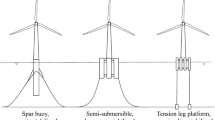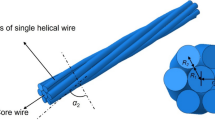Abstract
The gradual advances of offshore oil and gas exploitation and the development tendency of equipment integration have prompted the design of a new type of the high-current composite umbilical to meet development needs. In order to study the mechanical behavior of the high-current composite umbilical (HCCU) and provide design suggestions, a theoretical analysis framework of the tension-torsion coupled behavior of the spirally wound structure is proposed, which focuses more on the radial mechanical behavior. Then, by considering the mechanical and thermal conditions during the operation of HCCU, a semi-analytical method of the tension and torsion stiffness of the high-current composite umbilical considering the temperature effect is established. Furthermore, a practical case of HCCU is given, and the thermal effect on the radial and axial mechanical behaviors are analyzed. It is found that the thermal effect has a significant influence on the radial stiffness, and shows non-linear variation characteristics. Finally, the sensitivity analysis is carried out to study the influence of the design parameter on the stiffness of tension and torsion. The results indicated that the equivalent radial stiffness and helical angle have obvious effect on the tension-torsion coupled stiffness, which can provide reasonable reference for the design of HCCU.
Similar content being viewed by others
References
Amjadi, M., and Fatemi, A., 2020. Tensile behavior of high-density polyethylene including the effects of processing technique, thickness, temperature, and strain rate, Polymers, 12(9), 1857.
API, R.P., 2008. 1E Specification for Subsea Production Control Umbilical, American Petroleum Institute, Washington, DC.
Bouaanani, N. and Marcuzzi, P., 2011. Finite difference thermoelastic analysis of suspended cables including extensibility and large sag effects, Journal of Thermal Stresses, 34(1), 18–50.
Chang, H.C. and Chen, B.F., 2019. Mechanical behavior of submarine cable under coupled tension, torsion and compressive loads, Ocean Engineering, 189, 106272.
Chaplin, C.R., Rebel, G. and Ridge, I.M.L., 2000. Tension/torsion interactions in multicomponent mooring lines, Proceedings of the Offshore Technology Conference, Houston, Texas.
Costello, G.A., 1997. Theory of Wire Rope, second ed., Springer, New York.
Custódio, A.B. and Vaz, M.A., 2002. A nonlinear formulation for the axisymmetric response of umbilical cables and flexible pipes, Applied Ocean Research, 24(1), 21–29.
Foti, F. and Martinelli, L., 2016. Mechanical modeling of metallic strands subjected to tension, torsion and bending, International Journal of Solids and Structures, 91, 1–17.
Gela, G. and Dai, J.J., 1988. Calculation of thermal fields of underground cables using the boundary element method, IEEE Transactions on Power Delivery, 3(4), 1341–1347.
Hamdan, M.A., Pilgrim, J.A. and Lewin, P.L., 2020. Analysis of thermo-mechanical stress in three core submarine power cables, IEEE Transactions on Dielectrics and Electrical Insulation, 27(4), 1288–1296.
Hanna, M.A., Chikhani, A.Y. and Salama, M.M.A., 1993. Thermal analysis of power cables in multi-layered soil. I. Theoretical model, IEEE Transactions on Power Delivery, 8(3), 761–771.
Hruska, F.H., 1952. Radial forces in wire ropes, Wire and Wire Products, 27(5), 459–463.
Huang, Z.Y., Pilgrim, J.A., Lewin, P.L., Swingler, S.G. and Tzemis, G., 2014. Numerical thermo-mechanical stress analysis for HVDC cables, 2014 IEEE Electrical Insulation Conference, IEEE, Philadelphia, PA, USA, pp. 387–391.
IEC, 1993. Electric cables — Calculation of the current rating — Part 1: Current rating equations (100% load factor) and calculations of losses — Section 2: Sheath eddy current loss factors for two circuits in flat formation, IEC 60287-1-2:1993, IEC Publication, Geneva.
IEC, 1994a. Electric cables — Calculation of the current rating — Part 1: Current rating equations (100 % load factor) and calculation of losses — Section 1: General, IEC 60287-1-1:1994, IEC Publication, Geneva.
IEC, 1994b. Electric cables — Calculation of the current rating — Part 2: Thermal resistance — Section 1: Calculation of thermal resistance, IEC 60287-2-1:1994, IEC Publication, Geneva.
Jolicoeur, C. and Cardou, A., 1991. A numerical comparison of current mathematical models of twisted wire cables under axisymmetric loads, Journal of Energy Resources Technology, 113(4), 241–249.
Knapp, R.H., 1979. Derivation of a new stiffness matrix for helically armoured cables considering tension and torsion, International Journal for Numerical Methods in Engineering, 14(4), 515–529.
Knapp, R.H., 1981. Torque and stress balanced design of helically armored cables, Journal of Engineering for Industry, 103(1), 61–66.
Liu, H., Wang, H., Song, B., Han, X.R., Han, B. and Lin, J.Y., 2021. Modeling of braided wire ropes under tension and torsional loads, The Journal of Strain Analysis for Engineering Design, 56(4), 216–224.
Liu, J.P. and Vaz, M.A., 2016. Axisymmetric viscoelastic response of flexible pipes in time domain, Applied Ocean Research, 55, 181–189.
Liu, Z.Q., Hao, J., Liao, R.J., Li, J., Gao, Z. and Liang, Z.B., 2019. Morphological, structural, and dielectric properties of thermally aged AC 500 kV XLPE submarine cable insulation material and its deterioration condition assessment, IEEE Access, 7, 165065–165075.
Ramos Jr., R., de Arruda Martins, C., Pesce, C.P. and Roveri, F.E., 2008. A case study on the axial-torsional behavior of flexible risers, Proceedings of the 27th International Conference on Offshore Mechanics and Arctic Engineering, 481–491.
Ridge, I.M.L., 2009. Tension-torsion fatigue behaviour of wire ropes in offshore moorings, Ocean Engineering, 36(9–10), 650–660.
Shugai, G. and Yakubenko, P.A., 2008. Thermo-physical processes during the production of XLPE insulated cables, American Society of Mechanical Engineers, Heat Transfer Division, 374(3), 377–385.
Slotboom, O.F., 1995. Simplified estimation of helically steel armored cable elongation, diameter reduction, and rotation, ‘Challenges of Our Changing Global Environment’. Conference Proceedings, IEEE, San Diego, CA, USA, pp. 126–137.
Utting, W.S. and Jones, N., 1988. Axial-torsional interactions and wire deformation in 19-wire spiral strand, The Journal of Strain Analysis for Engineering Design, 23(2), 79–86.
Wang, S.R., Wang, Z.L., Chen, Y.B., Wang, Y.H. and Huang, Q.X., 2020. Mechanical performances analysis of tension-torsion coupling anchor cable, International Journal of Simulation Modelling, 19(2), 231–242.
Witz, J.A. and Tan, Z., 1992. On the axial-torsional structural behaviour of flexible pipes, umbilicals and marine cables, Marine Structures, 5(2–3), 205–227.
Xiang, L., Wang, H.Y., Chen, Y., Guan, Y.J. and Dai, L.H., 2017. Elastic-plastic modeling of metallic strands and wire ropes under axial tension and torsion loads, International Journal of Solids and Structures, 129, 103–118.
Xiang, L., Wang, H.Y., Chen, Y., Guan, Y.J., Wang, Y.L. and Dai, L. H., 2015. Modeling of multi-strand wire ropes subjected to axial tension and torsion loads, International Journal of Solids and Structures, 58, 233–246.
Yan, J., Su, Q., Bu, Y.F., Yang, Z.X., Lu, Q.Z. and Yue, Q.J., 2021. Electro—thermal—mechanical coupled analysis on two high-current composite umbilical cable cross sections, Journal of Offshore Mechanics and Arctic Engineering, 143(6), 061802.
Yang, Z.X., Lu, Q.Z., Yan, J., Chen, J.L. and Yue, Q.J., 2018. Multi-disciplinary optimization design for the section layout of umbilicals based on intelligent algorithm, Journal of Offshore Mechanics and Arctic Engineering, 140(3), 031702.
Yang, Z.X., Su, Q., Yan, J., Wu, S.H., Mao, Y.D., Lu, Q.Z. and Wang, H.L., 2021a. Study on the nonlinear mechanical behaviour of an umbilical under combined loads of tension and torsion, Ocean Engineering, 238, 109742.
Yang, Z.X., Yan, J., Sævik, S., Lu, Q.Z., Ye, N.Q., Chen, J.L. and Yue, Q.J., 2021b. Integrated optimisation design of a dynamic umbilical based on an approximate model, Marine Structures, 78, 102995.
Author information
Authors and Affiliations
Corresponding author
Additional information
Foundation item: This research was financially supported by the National Key R&D Program of China (Grant No. 2021YFA1003501), the National Natural Science Foundation of China (Grant Nos. U1906233 and 52001088), the Key R&D Program of Shandong Province (Grant No. 2019JZZY010801), and the Fundamental Research Funds for the Central Universities (Grant Nos. DUT20ZD213 and DUT20LAB308).
Rights and permissions
About this article
Cite this article
Yan, J., Su, Q., Bu, Yf. et al. Study on the Nonlinear Tension—Torsion Coupled Stiffness of the High-Current Composite Umbilical Considering the Thermal Effect. China Ocean Eng 36, 588–600 (2022). https://doi.org/10.1007/s13344-022-0056-1
Received:
Revised:
Accepted:
Published:
Issue Date:
DOI: https://doi.org/10.1007/s13344-022-0056-1




